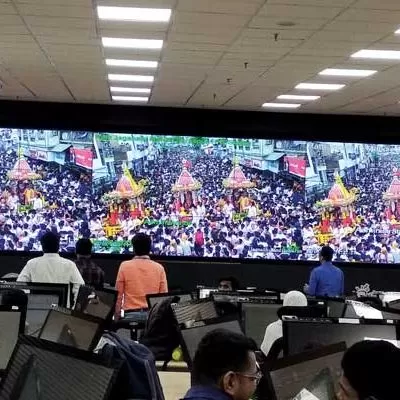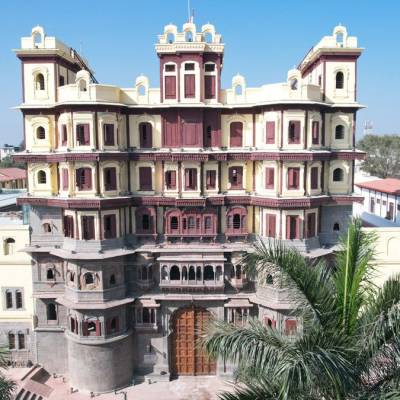- Home
- Infrastructure Urban
- SMART CITIES
- The expansion plans of Keys Hotels include Tier-II and Tier-III smart cities

The expansion plans of Keys Hotels include Tier-II and Tier-III smart cities
Berggruen Hotels was founded in September 2006 to build and operate mid-market segment business hotels under the brand Keys Hotels in India. Today, the group has deepened its investments in the brand in order to expand the portfolio and become a dominant player across different segments.
It has three sub-brand categories: Keys Prima at the upper end of the mid-market segment; Keys Hotels at the mid-market segment; and Keys Lite at the lower end of the mid-market segment. With 21 hotels in India already, it is now aiming to add up to 20 properties under Keys Hotels across the country by the end of 2018 as part of its aggressive expansion plans.
Vikas Chadha, Executive Director & CFO, Berggruen Hotels, shares more on the hospitality sector and the firm's expansion plans in conversation with SERAPHINA D'SOUZA.
How do you see the growth potential of the hospitality sector in the country?
India has great potential to drive positive growth for the hospitality sector across all segments, whether it is luxury, budget or mid-priced. With an increasing disposable income, the middle class is more aware about its travel and stay spends. Numbers from a KPMG study show that the hospitality sector in India is expected to grow at 16.1 per cent CAGR to reach Rs 2,796.9 thousand crore in 2022. The hospitality sector in India creates job opportunities, attracts FDI inflow and contributes significantly to indirect tax revenue at the state and central levels, which includes revenues from VAT, service tax, luxury tax, etc. The government must provide full support in incentivising the sector and overall taxation on hospitality should be reduced to stimulate growth and make India competitive against other internationally renowned hospitality chains.
Give us an update on the 20 properties you plan to add along with your expansion plans in the next five years.
Berggruen Hotels is on an aggressive growth trajectory, and is expanding its presence in India via the asset-light strategy. At this point, we are focused on becoming a dominant mid-market player within the Indian hospitality industry.
The expansion plans of Keys Hotels include not only metros and Tier-I cities but Tier-II and Tier-III cities, which are stated as smart cities. Keys recently launched four new hotels in Calicut, Visakhapatnam, Manali and Jaipur. In the year ahead, we plan to open seven to eight hotels under management contracts. Keys Hotels will be launched in Port Blair in the first half of 2017.
Under which segment and how do you plan to develop the 20 hotels? Are there any immediate procurement plans for materials, interiors fittings, technology, construction equipment, etc?
Keys Hotels has a strong growth strategy of expanding through additions of several leisure, business, and mid-market hotels. Keys Prima Hotels, Keys Hotels, and Keys Lite Hotels cater to different market segments. We plan to add two to three Keys Prima Hotels, six to seven Keys Hotels, and four to five Keys Lite Hotels in the next 12-24 months. We are focusing on procurement; given our expansion strategy, we will need materials, interior fittings, technology and construction equipment for each property.
Today, is business traction more towards managing hotels rather than owning them? Is it the asset light and asset-right model?
At present, the focus of the group's expansion strategy is on asset light, not owned hotels. The hotel chain wants to grow its network by offering management services to operational hotels or hotel projects under development. This is framed and structured in this way as we have seen a shift in the hospitality market and current trends. Of course, one advantage of owning the brick and-mortar belonging to someone else, often an individual or an investment fund, is that the company has absolute control over the hotel and its maintenance.
Give us an example of how a recently completed hotel has been developed for design innovations keeping current trends in mind. Also, does the group incorporate eco-friendly features in its hotels?
Our hotels are designed to give guests a comfortable stay. They enjoy facilities like WiFi, automated guest feedback system, women-friendly rooms with extra security features, modern rooms and security access. The designs allow for optimum utilisation of power, thereby saving costs as well as consumption of electricity, which is environment-friendly.
Tell us about the per-key cost of construction in different tiers or segments. How do you ensure and plan your RoI?
The cost per key of construction for us has been around $50,000 per key at a pan-India level. The hotels with the current costs are able to generate a positive gross operating profit by the third to sixth month of operation. The IRR for hospitality is calculated over the various economic cycles; in a period of five to 10 years, this would give double digit returns with additional growth in the capital value of asset for the owners.
Also, tell us about your planned investments. On which areas will the company spend the money raised in the near future?
Berggruen Holdings, a $2 billion private equity and venture capital firm founded by billionaire investor Nicolas Berggruen, has invested Rs 200 crore in a fresh round of funding in the mid-segment business Keys Hotels, which is operated by Berggruen Hotels in India. The investment will be used to expand the Keys brand in India through an asset-light model and more management and franchising agreements. We have 21 operational hotels and plan to expand by adding eight to 12 new hotels this year. Through new hotels, the number of rooms of Keys Hotels will go up to over 3,000 at the end of this year from the present 2,200.
In terms of business growth, how did the firm perform in FY16-17 and what are your expectations for FY17-18? Having achieved a key size of over 2,200, what is your target or plan for 2020, considering your vast expansion plans?
Keys Hotels has had a same-hotel sales growth of 23-27 per cent, which is almost twice the growth rate the industry has achieved. We will soon be announcing our foray into new destinations and our plans for 2020, which includes the launch of new properties. Currently, our main focus is to work on technology and distribution. We are looking at how we would be able to sell better and distribute our hotels better. We are looking at options in the reservation or booking ecosystem, which will allow reservation upgrade, management of inventory and pricing management to become a lot more efficient.
Besides strengthening the portfolio, another important objective of Berggruen Hotels for the Indian hospitality industry in the next five years is to strengthen the RevPAR of all hotels.
To share your views on this interview, write in at feedback@ConstructionWorld.in
- Vikas Chadha, Executive Director & CFO, Berggruen Hotels Berggruen Hotels was founded in September 2006 to build and operate mid-market segment business hotels under the brand Keys Hotels in India. Today, the group has deepened its investments in the brand in order to expand the portfolio and become a dominant player across different segments. It has three sub-brand categories: Keys Prima at the upper end of the mid-market segment; Keys Hotels at the mid-market segment; and Keys Lite at the lower end of the mid-market segment. With 21 hotels in India already, it is now aiming to add up to 20 properties under Keys Hotels across the country by the end of 2018 as part of its aggressive expansion plans. Vikas Chadha, Executive Director & CFO, Berggruen Hotels, shares more on the hospitality sector and the firm's expansion plans in conversation with SERAPHINA D'SOUZA. How do you see the growth potential of the hospitality sector in the country? India has great potential to drive positive growth for the hospitality sector across all segments, whether it is luxury, budget or mid-priced. With an increasing disposable income, the middle class is more aware about its travel and stay spends. Numbers from a KPMG study show that the hospitality sector in India is expected to grow at 16.1 per cent CAGR to reach Rs 2,796.9 thousand crore in 2022. The hospitality sector in India creates job opportunities, attracts FDI inflow and contributes significantly to indirect tax revenue at the state and central levels, which includes revenues from VAT, service tax, luxury tax, etc. The government must provide full support in incentivising the sector and overall taxation on hospitality should be reduced to stimulate growth and make India competitive against other internationally renowned hospitality chains. Give us an update on the 20 properties you plan to add along with your expansion plans in the next five years. Berggruen Hotels is on an aggressive growth trajectory, and is expanding its presence in India via the asset-light strategy. At this point, we are focused on becoming a dominant mid-market player within the Indian hospitality industry. The expansion plans of Keys Hotels include not only metros and Tier-I cities but Tier-II and Tier-III cities, which are stated as smart cities. Keys recently launched four new hotels in Calicut, Visakhapatnam, Manali and Jaipur. In the year ahead, we plan to open seven to eight hotels under management contracts. Keys Hotels will be launched in Port Blair in the first half of 2017. Under which segment and how do you plan to develop the 20 hotels? Are there any immediate procurement plans for materials, interiors fittings, technology, construction equipment, etc? Keys Hotels has a strong growth strategy of expanding through additions of several leisure, business, and mid-market hotels. Keys Prima Hotels, Keys Hotels, and Keys Lite Hotels cater to different market segments. We plan to add two to three Keys Prima Hotels, six to seven Keys Hotels, and four to five Keys Lite Hotels in the next 12-24 months. We are focusing on procurement; given our expansion strategy, we will need materials, interior fittings, technology and construction equipment for each property. Today, is business traction more towards managing hotels rather than owning them? Is it the asset light and asset-right model? At present, the focus of the group's expansion strategy is on asset light, not owned hotels. The hotel chain wants to grow its network by offering management services to operational hotels or hotel projects under development. This is framed and structured in this way as we have seen a shift in the hospitality market and current trends. Of course, one advantage of owning the brick and-mortar belonging to someone else, often an individual or an investment fund, is that the company has absolute control over the hotel and its maintenance. Give us an example of how a recently completed hotel has been developed for design innovations keeping current trends in mind. Also, does the group incorporate eco-friendly features in its hotels? Our hotels are designed to give guests a comfortable stay. They enjoy facilities like WiFi, automated guest feedback system, women-friendly rooms with extra security features, modern rooms and security access. The designs allow for optimum utilisation of power, thereby saving costs as well as consumption of electricity, which is environment-friendly. Tell us about the per-key cost of construction in different tiers or segments. How do you ensure and plan your RoI? The cost per key of construction for us has been around $50,000 per key at a pan-India level. The hotels with the current costs are able to generate a positive gross operating profit by the third to sixth month of operation. The IRR for hospitality is calculated over the various economic cycles; in a period of five to 10 years, this would give double digit returns with additional growth in the capital value of asset for the owners. Also, tell us about your planned investments. On which areas will the company spend the money raised in the near future? Berggruen Holdings, a $2 billion private equity and venture capital firm founded by billionaire investor Nicolas Berggruen, has invested Rs 200 crore in a fresh round of funding in the mid-segment business Keys Hotels, which is operated by Berggruen Hotels in India. The investment will be used to expand the Keys brand in India through an asset-light model and more management and franchising agreements. We have 21 operational hotels and plan to expand by adding eight to 12 new hotels this year. Through new hotels, the number of rooms of Keys Hotels will go up to over 3,000 at the end of this year from the present 2,200. In terms of business growth, how did the firm perform in FY16-17 and what are your expectations for FY17-18? Having achieved a key size of over 2,200, what is your target or plan for 2020, considering your vast expansion plans? Keys Hotels has had a same-hotel sales growth of 23-27 per cent, which is almost twice the growth rate the industry has achieved. We will soon be announcing our foray into new destinations and our plans for 2020, which includes the launch of new properties. Currently, our main focus is to work on technology and distribution. We are looking at how we would be able to sell better and distribute our hotels better. We are looking at options in the reservation or booking ecosystem, which will allow reservation upgrade, management of inventory and pricing management to become a lot more efficient. Besides strengthening the portfolio, another important objective of Berggruen Hotels for the Indian hospitality industry in the next five years is to strengthen the RevPAR of all hotels. To share your views on this interview, write in at feedback@ConstructionWorld.in




















